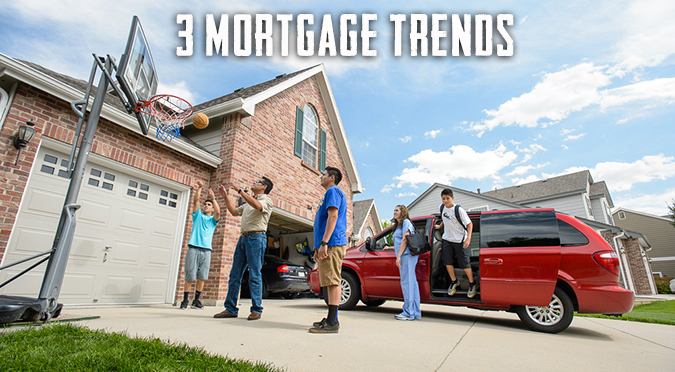The decision to rent or buy a home is an important one. When weighing your options, look at price, your lifestyle and the bigger picture. Here, we lay out the pros and cons behind each scenario.
Buying a Home – Pros
Tax benefits
There are many pros to buying a home, but perhaps none are bigger than the tax benefits. Tax breaks, a tax concession or advantage allowed by the government, can be rewarding to homeowners. These can include lucrative benefits, such as the property tax deduction and mortgage interest deduction. In fact, homeowners can deduct interest expenses on up to $750,000 of mortgage debt from their income taxes.
Equity
One of the biggest advantages of buying a home is purely building equity. Home equity is the current market value of your home, minus what’s still left on your mortgage. It’s an asset that comes from a homeowner’s interest in a home. For example, if the home you purchase gains in value and is sold for more than you paid, you make a profit.
Security & stability
Unlike renting, homeownership gives you a sense of security as long as your mortgage is continually paid. You become your own landlord without the uncertainly of lease renewals and price increases. This particular pro is helpful to people with children who want to stay within school districts, those who like stability within their neighborhood or professionals who live near their work. Purchasing a home can help dodge any undesired disruption to your way of life. Best of all, owning a house means making your own rules. Barring any city or HOA policies, you have freedom when it comes to home improvements, pets, company and guests, and renting out the space.
Buying a Home – Cons
Cost
Ownership of a home comes at a large cost. Before taking the plunge, it’s important to fully grasp what this means. Not only will you need to make a down payment, but you should also consider property taxes, private mortgage insurance), homeowners insurance, and maintenance and repair costs.
Risk
Your biggest risk will be the hefty amount for the down payment. For example, imagine putting down $30,000 to purchase your property, and over the lifetime of your 30-year mortgage, the value of the home doesn’t increase. Your return, in this instance, would be nothing. While this does not take into account financial benefits such as the money you saved on taxes, it is a large investment to make nonetheless.
One of the biggest risks is the unknown. What if, for reasons out of your control, you are forced to quickly move and sell your home? Depending on the timeline between the purchase and your move, you might not earn back your closing costs even if you sell for the exact same price for which you bought.
Further cost risks include damage to the home itself such as foundation issues or the need for large repairs. It’s a good practice to have an emergency fund in place to offset these costs and to work closely with your real estate agent to find a reputable home inspector before the purchase of the home.
Renting – Pros
Fixed price
Renting a home also has its benefits. The first and most important one being price. Unlike owning a home, the down payment is not a factor. You will be required to pay rent every month and more than likely a security deposit upfront. However, you will know these fees at the very beginning of your lease. This means that your monthly housing cost will be fixed for the length of your lease. These agreements can be as short as a month-to-month contract or even reach to a two-year rental agreement. Best of all, repairs and general maintenance are usually included when you sign on the dotted line.
Flexibility
There is usually a bit of flexibility when it comes to your lease. Depending on what you’re looking for, renters are typically able to sign a lease that is less than a year, right at 12 months or even longer in length. This means that if you’re not entirely sure what your next move will be or how long you intend on staying in a particular location, you and the landlord can decide what works best for your contract and timeline. Even if for unexpected reasons you have to break the lease, the financial consequences are smaller than reselling a home at a loss.
Renting – Cons
Less freedom and guarantee
When you rent, all of the money you spend is purely an expense. Unlike homeownership, there’s no ability to gain equity. Since this isn’t an investment, the home is solely serving the purpose of providing you a place to live.
Renting also means you are at the mercy of guidelines provided by the landlord. If you are eager to paint the walls or bring home a pet, you may not be able to do so under the rules of your apartment or home rental. It is not up to your discretion to make these decisions, although they are usually highlighted upfront before you sign the lease.
There are also fewer guarantees about the future. At the end of your lease, there is no assurance for a re-sign. For example, the landlord might be interested in selling the space completely or have an opportunity to rent it out at a higher price than you can pay. In this scenario, you would be forced to find a different home. The risk factors include being forced out of your desired neighborhood or being unable to find a new home at a similar price.
Future costs
Further costs can also be associated with renting due to more frequent moves. By the time you hire a moving company or truck and put down new deposits on your lease and/or utilities, the expenses will begin to add up. It’s also important to consider the time you’ll spend packing up, unloading and getting settled.
All of these factors should be taken into consideration. If you are thinking about buying a home and want an expert opinion, please contact our mortgage team. We are here to help. You may also try our mortgage affordability calculators or sign up for a complimentary seminar.


